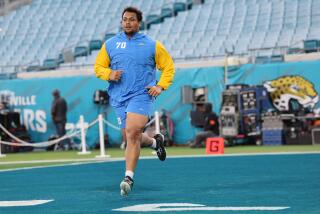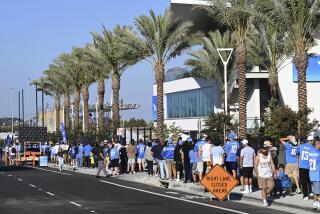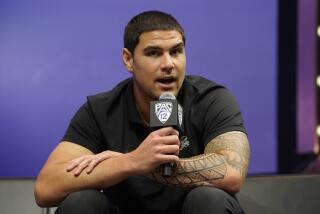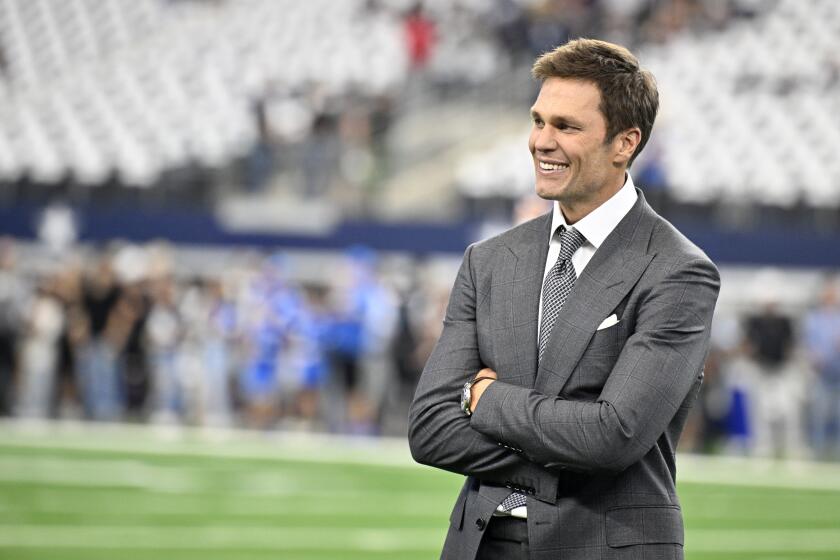Conditioning Key to Walker
Northwestern’s football teams traditionally have been short on talent, but big on heart and character. Randy Walker added another intangible when he became the Wildcat coach after the 1998 season: a conditioning drill that Walker did when he was a fullback at Miami of Ohio.
Players are required to complete 10 sprints of 100 yards, then eight of 80 yards, six of 60 yards and four of 40 yards, covering each distance in a specific time.
On Friday, safety Rashidi Wheeler collapsed before he could run the 40s--completing the drill is a prerequisite for making the roster--and later died of bronchial asthma, according to the Cook County coroner’s office.
“I don’t think it was a workout that was extraordinarily difficult,” Walker said. “It probably was the easiest day of summer workouts. There was no other running or any other conditioning.”
In the past, Walker has made no apology for his military approach to practice. He grew up in Troy, Ohio, and told the Columbus Dispatch in an August 1999 interview that his father afforded Ohio State coaching legend Woody Hayes “near deity status.”
Walker, 47, told the paper that the Wildcat players were open to his approach.
“They’re looking for a plan,” he said. “I was a history major so I know when people are in desperate situations and someone gives them a plan--whether it’s good or bad, whether it’s the Continental Congress or Hitler--they’re receptive.”
On Wednesday, at the Big Ten Conference’s annual football media day in Chicago, Walker was asked about the death early that morning of Minnesota offensive tackle Korey Stringer from heatstroke.
“I don’t ever want something like that to happen,” he said. “I can’t imagine. . . . I just thank God that I’ve been coaching 26 years and I’ve never been put in that position. I can’t imagine how awful that feels.”
There have been warning signs at Northwestern. Last August at the Wildcats’ summer camp in Kenosha, Wis., with a heat index in the low 90s, Walker ended a two-hour practice by having players run 16 100-yard sprints.
The Chicago Daily Herald reported that several Wildcats, including a regurgitating linebacker, Napoleon Harris, dropped out of the drill. Pete Chapman, a 6-foot-3, 292-pound defensive tackle, completed the regimen but was seen convulsing before being rushed to Kenosha Hospital when his body temperature reached 106 degrees. Chapman spent two nights in the hospital recovering from heat exhaustion. Two other players were treated at the hospital and released.
“Honestly, I don’t really remember running the last couple of 100s,” Chapman said a month later.
Northwestern Athletic Director Rick Taylor told the Chicago Tribune that the department planned to bring in consultants to review Walker’s training program. Walker said he was doing “a lot of self-searching” in the hours after Wheeler’s death. He also was asked why he pushes his players to such an extreme.
“I see great things in these guys,” he said. “Sometimes they don’t see it in themselves. I look at what we ask. . . . I don’t think it’s extraordinary.”
It was not the first time Walker has been questioned about his training program. In June, he was asked about it in an interview with the Sporting News.
“I don’t apologize,” he said. “We try to establish a real high level of conditioning. I don’t ever want to walk off the field at the end of the game thinking we lost because we didn’t have a conditioning program in place.”
More to Read
Go beyond the scoreboard
Get the latest on L.A.'s teams in the daily Sports Report newsletter.
You may occasionally receive promotional content from the Los Angeles Times.










